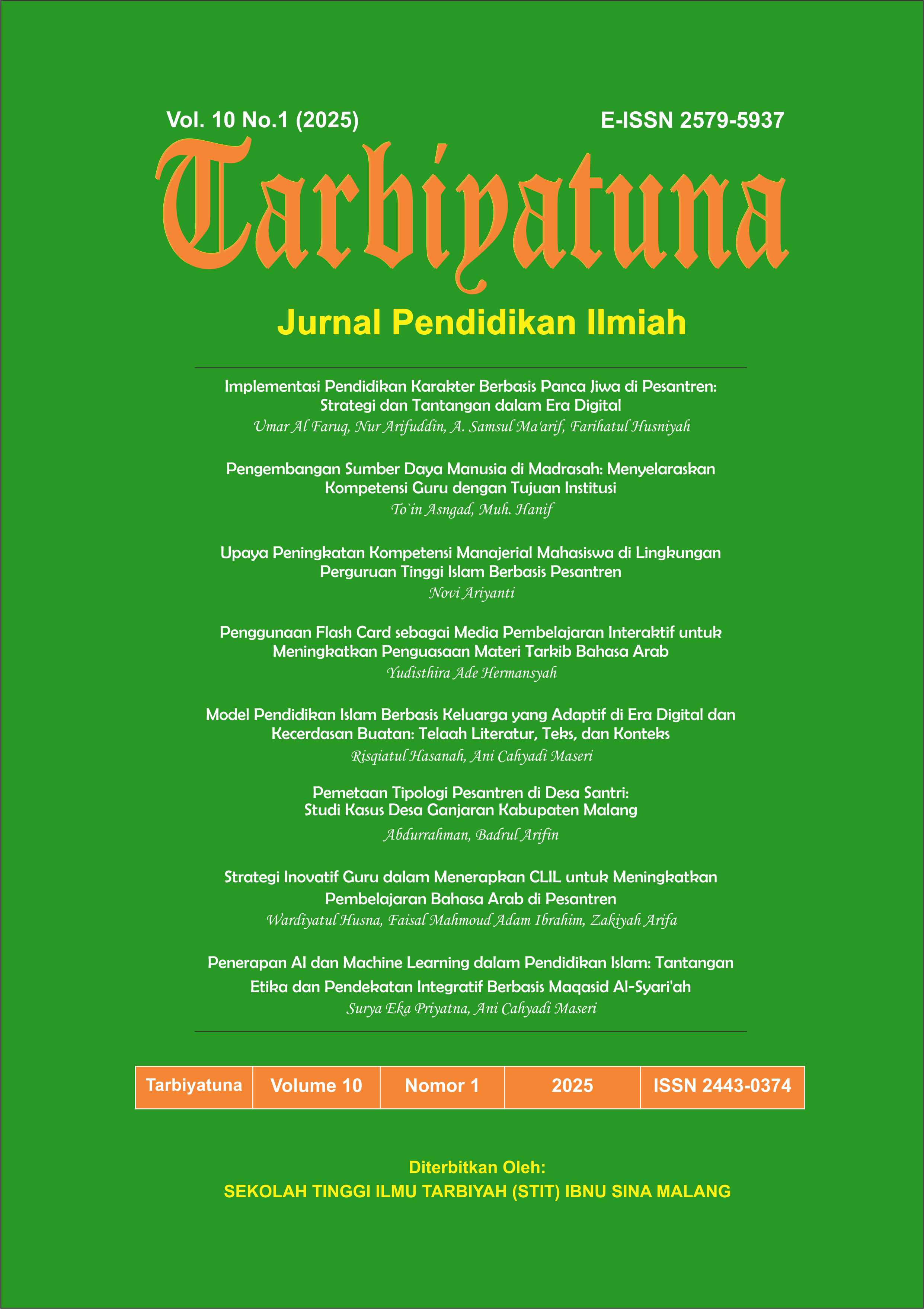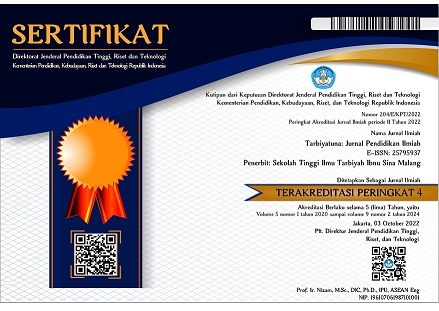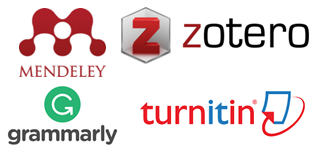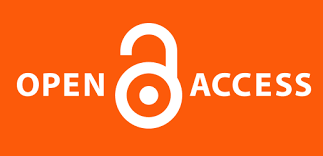Penerapan AI dan Machine Learning dalam Pendidikan Islam: Tantangan Etika dan Pendekatan Integratif Berbasis Maqāṣid Al-Syarī‘ah
Abstract
Digital transformation in education presents strategic opportunities for the implementation of Artificial Intelligence (AI) and Machine Learning, which are now increasingly being integrated into the development of educational systems and learning processes within Islamic education environments. This article aims to explore in depth the application of Artificial Intelligence (AI) and Machine Learning in Islamic learning, with a focus on identifying ethical challenges and formulating integrative strategies grounded in the values of maqāṣid al-sharī‘ah and the principle of wasathiyyah in the development of educational digital technology systems. AI has been proven to enhance learning personalization, administrative efficiency, and accessibility to a wide range of religious materials. However, the adoption of this technology also raises various ethical dilemmas, such as data privacy, algorithmic bias, and the potential marginalization of the teacher’s role as the primary educator. Using a theoretical approach based on wasathiyyah and the Islamic ethical framework, this article develops an evaluative model for AI implementation to ensure alignment with Islamic values and the cultivation of students' spiritual character. This study employs a qualitative-descriptive approach through a literature review of verified academic sources discussing the integration of Artificial Intelligence (AI) in Islamic education, in order to examine its concepts, benefits, challenges, and ethical-spiritual dimensions
References
Achruh, A., Rapi, M., Rusdi, M., & Idris, R. (2024). Challenges and Opportunities of Artificial Intelligence Adoption in Islamic Education in Indonesian Higher Education Institutions. International Journal of Learning, Teaching and Educational Research, 23(11), 423-443.
Adlani, N., Hanifah, M., & Alfarizi, S. (2024). The Role Of Big Data In Managerial Decision-Making In Islamic Educational Institutions: An Artificial Intelligence-Based Approach. Transformation in Islamic Management and Education Journal, 1(1), 22-32.
Agustina, D., Maryam, M., & Marhamah, S. (2023). Natural Language Processing For Interactive And Personalized Qur’Anic Education. International Journal Of Technology And Modeling, 2(2), 90-97.
Al-Attas, M. N. (1980). The concept of education in Islam (pp. 1-17). Kuala Lumpur: Muslim Youth Movement of Malaysia.
Al-Attas, S. M. N. (1993). Islam and Secularism. Kuala Lumpur: ISTAC.
Al-Attas, S. M. N. (1995). Prolegomena to the Metaphysics of Islam: An Exposition of the Fundamental Elements of the Worldview of Islam. International Institute of Islamic Thought and Civilization.
Ali, M. (2021). Big Data dan Etika dalam Pendidikan Islam: Analisis Maqasid Syariah. Jurnal Ilmu Pendidikan Islam, 4(1), 88–102. https://doi.org/10.1016/j.ipis.2021.01.007
Ammar, A., & Baig, M. (2022). Sharia-Compliant Artificial Intelligence: Challenges and Prospects. Journal of Islamic Ethics, 6(2), 85–102.
Candra, K. (2025). Pembelajaran Masa Depan: Transformasi AI dan e-learning di Era Pendidikan Digital. Bengkulu: Yayasan Sahabat Alam Rafflesia.
Donatus, U. O., Obinna, V. O., Samuel, U. O., Odera, C. U., & Nkechi, F. O. (2024). The Ethical Implications of Artificial Intelligence in Education. AJAP-AMAMIHE Journal of Applied Philosophy, 22(2). http://dx.doi.org/10.13140/RG.2.2.21082.35528
Elihami, E., Mas’ud, M. I., & Darmawan, A. (2024). Exploring the Landscape: challenges and opportunities in islamic education technology. Jurnal Pendidikan Progresif, 14(2), 1071-1092. http://dx.doi.org/10.23960/jpp.v14.i2.202478
Feenberg, A. (2012). Questioning technology. London: Routledge.
Ferdi Hasan, M., Patty, A., Sani, A., & Taufiq, F. (2023). Chat GPT as A Learning Assistant for Islamic Education: A Study In Madrasah Ibtidaiyah. Nadwa: Jurnal Pendidikan Islam, 17(2), 203-230. https://doi.org/10.21580/nw.2023.17.2.26167
Floridi, L., et al. (2018). AI4People An Ethical Framework for a Good AI Society: Opportunities, Risks, Principles, and Recommendations. Minds and Machines, 28(4), 689–707. https://doi.org/10.1007/S11023-018-9482-5
Hastuti, H., & Hartono, N. (2024). Rekonstruksi Pendidikan Islam Berbasis Technoscience: Optimalisasi Kecerdasan Buatan Untuk Pembelajaran Inovatif. Kaunia: Integration and Interconnection Islam and Science Journal, 20(2), 73-86.
Holmes, W., Bialik, M., & Fadel, C. (2019). Artificial Intelligence in Education: Promises and Implications for Teaching and Learning. Boston: Center for Curriculum Redesign. https://doi.org/10.1007/978-3-319-60013-0_107-1
Huda, M. (2022). AI and Ethics: Integrating Maqasid Al-Shariah in Islamic Learning Systems. Journal of Technology in Islamic Pedagogy, 7(1), 17–34.
Hudayana, N. A., Haris, A., & Zakaria, A. R. (2024). Pengembangan Aplikasi Penyimak Al-Qur’an Menggunakan Teknologi AI dengan Metode Speech Recognition pada Platform Android. Journal of Islamic Education, 2(2), 83-93. https://doi.org/10.61231/jie.v2i2.314
Kausar, S., Leghari, A. R., & Soomro, A. S. (2024). Analysis of the Islamic Law and its compatibility with artificial intelligence as a emerging challenge of the modern world. Annals of Human and Social Sciences, 5(1), 99-114. https://doi.org/10.35484/ahss.2024(5-I)10
Kosasih, E., Islamy, M. R. F., & Wiwaha, R. S. (2024). Artificial Intelligence in the Era of Society 5.0: Compromising Technological Innovation Through theWasathiyyah Approach within the Framework of Islamic Law. Al-Istinbath: Jurnal Hukum Islam, 9(2), 551-572. https://doi.org/10.29240/jhi.v9i2.9596
Kurniawan, A. (2021). Digitalisasi Manajemen Keuangan Pesantren melalui Platform Donasi Berbasis AI. Jurnal Ekonomi Syariah, 13(2), 87–98.
Latif, A. (2023). AI dalam Pendidikan Agama Islam: Antara Efisiensi dan Kekhawatiran Moral. Jurnal Pendidikan Islam dan Teknologi, 8(2), 154–170. https://doi.org/10.1234/jpit.v8i2.231
Maryani, I. (2025). Artificial Intelligence Dalam Pendidikan: Sebuah Bunga Rampai. Bantul: K-Media.
Mas’ar, F. (2024, February). Artificial Intelligence and Islamic Ethics: A Framework for Ethical AI Development Based on Maqasid Al-Shariah. In International Conference on Artificial Intelligence, Navigation, Engineering, and Aviation Technology (Vol. 1, No. 1, pp. 521-523).
Masuroh, I. S., & Mardani, D. A. (2025). Artificial Intelligence Dan Pendidikan Pendidikan Islam: Sebuah Pendekatan Holistik Implementatif. INTEGRATIF| Jurnal Magister Pendidikan Agama Islam, 6(1), 85-101.
Mishra, P. (2025). Revolutionizing Education With AI and ML. Internet of Behavior-Based Computational Intelligence for Smart Education Systems, 53-94. https://doi.org/10.4018/979-8-3693-8151-9.ch003
Mohamad, S. M. (2024). Mediated Muslim Cosmopolitanism: New Media and Popular Culture Engagements in Brunei and Malaysia. Taylor & Francis.
Munir, M. (2021). Kecerdasan Buatan dan Transformasi Pembelajaran Pendidikan Agama Islam. Jurnal Teknologi Pendidikan, 23(2), 102–117.
Mustapa, K., Gagaramusu, Y. B. M., Palandi, E. H., Syakhrani, A. W., & Towpek, H. (2023). Technology-enhanced education: Nurturing the digital generation-experiences in Islamic schools in Indonesia. International Journal of Teaching and Learning, 1(1), 16-40.
Mustapha, R., & Malkan, S. N. A. (2025). Maqasid Al-Shariah In The Ai Era: Balancing Innovation And Islamic Ethical Principles. International Journal of Islamic Theology & Civilization (E-ISSN-3009-1551), 3(3), 1-21. https://doi.org/10.5281/zenodo.15381828
Nasr, S. H. (1994). A Young Muslim’s Guide to the Modern World. Chicago: Kazi Publications.
Padilah, D., Pambudi, A., & Az-Zahra, F. F. (2024). Analisis Prediksi Tajwid Nun Mati Pada Ayat Al-Quran Dengan Metode Yolov8 (You Only Look Once). JATI (Jurnal Mahasiswa Teknik Informatika), 8(5), 10190-10196. https://doi.org/10.36040/jati.v8i5.10963
Papakostas, C. (2025). Artificial Intelligence in Religious Education: Ethical, Pedagogical, and Theological Perspectives. Religions, 16(5), 563. https://doi.org/10.3390/rel16050563
Rahmah, S., & Badruddin, A. (2023). Adab Digital dan Implementasi AI di Pesantren. Jurnal Etika Islam Digital, 3(1), 66–81.
Rahman, G. (2025). Transforming Islamic Education Through Value-Based Leadership: A Narrative Review. Sinergi International Journal of Islamic Studies, 3(2), 83-95. https://doi.org/10.61194/ijis.v3i2.712
Sahidin, A. (2022). Islamisasi Ilmu Pengetahuan Al-Attas Menjawab Problematika Sekularisme Terhadap Ilmu Pengetahuan. IMTIYAZ: Jurnal Ilmu Keislaman, 6(2), 113-126.
Shukor, S. A., Osman, N. D., & Juliansyahzen, M. I. (2024). Maqasid Syariah-Based Ethics In Law And Syariah Programmes In Higher Education: Guarding Emerging Technology. LexForensica: Journal of Forensic Justice and Socio-Legal Research, 1(1), 34-40. https://doi.org/10.33102/kgwx6f94
Sofa, A. R., Anam, K., Ramadhani, K., Hasan, M., Amin, M. H. S., & Helmi, M. (2025). Pengembangan penilaian pembelajaran pendidikan agama Islam berbasis Turnitin, Scribo AI, dan ChatGPT di Pesantren Raudlatul Hasaniyah: Implementasi dan strategi pada siswa Madrasah Aliyah. Indonesian Research Journal on Education, 5(2), 775-781. https://doi.org/10.31004/irje.v5i2.2270
Susilawati, E., Rezeki, Y. S., Salam, U., & Husin, S. (2024). Workshop Pengembangan Media Pembelajaran Inovatif Berbasis Artificial Intelligence (AI) Bagi Guru-Guru Bahasa Inggris Madrasah Tsanawiyah Dan Madrasah Aliyah Kabupaten Mempawah. Jurnal Abdimas Ilmiah Citra Bakti, 5(3), 693-704.
UNESCO. (2015). Rethinking Education: Towards a Global Common Good? Paris: UNESCO Publishing.
UNESCO. (2021). AI and Education: Guidance for Policy-makers. Paris: UNESCO Publishing.
Wati, A., Anggun, R., Hidayat, A., & Farhurohman, O. (2025). Implementasi Pembelajaran Yang Dipersonalisasi Berbasis AI (Artificial Intelligence) dalam Meningkatkan Hasil Belajar Siswa. Jurnal Ilmiah Pendidikan Dasar (JIPDAS), 5(2), 1816-1823. https://doi.org/10.37081/jipdas.v5i2.3028
Yusuf, M. (2022). Digital Transformation in Islamic Education: Challenges of Maintaining Spiritual Authenticity. International Review of Islamic Education, 9(1), 77–93.
Zainuddin, A. (2023). Etika Kecerdasan Buatan dalam Pendidikan Islam. Jurnal At-Ta'dib, 18(1), 45–60.
Zhou, Z., Xu, R., & Wang, L. (2020). Artificial Intelligence in Educational Management: An Overview. Journal of Intelligent Systems, 29(1), 55–70.








.png)

